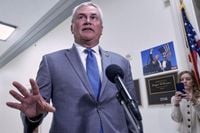On Monday, August 25, 2025, the House Oversight Committee, led by Republican Chairman James Comer of Kentucky, issued a sweeping subpoena to the estate of the late financier and convicted sex offender Jeffrey Epstein. The move marks a significant escalation in Congress’s ongoing investigation into the federal government’s handling of Epstein’s case and the broader enforcement of sex trafficking laws in the United States.
The subpoena, signed by Comer, demands the estate provide a broad array of documents, some of which have long been the subject of public fascination and speculation. Chief among these is Epstein’s infamous “birthday book,” a leather-bound volume reportedly compiled by his longtime associate Ghislaine Maxwell for his 50th birthday. According to The Wall Street Journal, this book contains letters and notes from dozens of Epstein’s powerful friends and acquaintances, including a letter allegedly signed by Donald Trump that read, “may every day be another wonderful secret.” Trump has denied authoring the letter and has filed a defamation lawsuit against The Wall Street Journal and its parent company, seeking at least $20 billion in damages over the report.
But the committee’s demands go far beyond the birthday book. The subpoena also seeks all flight logs, bank records, Epstein’s will, non-disclosure agreements, videos from his properties, contact and address books, and any records that could be "reasonably construed to be a potential list of clients involved in sex, sex acts, or sex trafficking" facilitated by Epstein. The requested documents span from 1990 through August 2019, the month Epstein was found dead by suicide in his Manhattan jail cell while awaiting trial on federal sex trafficking charges.
“It is our understanding that the Estate of Jeffrey Epstein is in custody and control of documents that may further the Committee’s investigation and legislative goals,” Comer wrote in the subpoena letter, as reported by CBS News. He set a firm deadline of September 8, 2025, for the estate to turn over the materials. Daniel Weiner, an attorney for the Epstein estate, responded that the co-executors "have always said, they will comply with all lawful process in this matter, and that includes the Committee’s subpoena," according to CNN.
The Oversight Committee’s probe is not limited to Epstein’s personal effects. Lawmakers have also called for testimony from a host of former government officials who played roles in the long and winding saga of Epstein’s prosecution. Former U.S. Attorney Alex Acosta, who oversaw the controversial 2008 plea deal that allowed Epstein to avoid federal prosecution and plead guilty to lesser state charges, is scheduled to appear for a transcribed interview on September 19. The Justice Department previously concluded that Acosta showed “poor judgment” in his handling of the case, a decision that has haunted him through his later service as Secretary of Labor under President Trump.
The committee has also sought to compel testimony from former President Bill Clinton, former Secretary of State Hillary Clinton, and former FBI Director James Comey, among others. Meanwhile, former Attorneys General Alberto Gonzales, Eric Holder, and Jeff Sessions have been permitted to submit formal written declarations stating they have "no information" pertaining to Epstein, as reported by Axios.
Pressure for greater transparency has come from both sides of the aisle. The investigation is a response to widespread public demand for more disclosure regarding Epstein’s social network and the possible mishandling of his case by prosecutors. Lawmakers want to uncover who among Epstein’s high-powered acquaintances may have been aware of or complicit in his sexual abuse of teenage girls. According to The Globe and Mail, the probe has “spurred conspiracy theories and roiled top officials in President Donald Trump’s administration.”
Last week, the Justice Department delivered thousands of pages of documents related to its Epstein investigation to the committee, following separate subpoenas. However, Democrats on the committee, led by Rep. Robert Garcia, have voiced frustration that only about “3 percent” of those documents contained new information, with most being already public records. Garcia praised the subpoena for the birthday book and Acosta’s forthcoming testimony as “important steps forward to get long-overdue answers about sex trafficker Jeffrey Epstein’s crimes.” He added, “It doesn’t matter who you are: If you were involved with Jeffrey Epstein and you hurt people, you need to be held accountable.”
The renewed congressional focus on Epstein comes after a July 2025 Department of Justice report stated there was no “client list” or evidence that Epstein blackmailed prominent figures—an assertion that has done little to quell public skepticism. The DOJ has since agreed to unseal grand jury transcripts from Epstein and Maxwell’s cases, as ordered by U.S. District Judge Richard Berman, although victims’ identities and child sexual abuse material will be redacted.
The Oversight Committee’s investigation is not the first time Congress has probed the government’s handling of the Epstein case, but the current effort appears more determined to force the disclosure of documents and testimony that have long remained out of public view. In addition to the subpoenaed documents, the committee is reviewing the possible mismanagement of the federal investigation, the circumstances of Epstein’s death, the operation of sex-trafficking rings, and potential violations of ethics rules by elected officials, according to Comer’s letter, as reported by The Globe and Mail.
Bipartisan interest in the case remains high. A group of House members is pushing for legislation that would require the Justice Department to release a full accounting of the investigation into Epstein, a move that could further increase pressure on both the DOJ and the White House. Democrats, for their part, have accused the Trump administration of stonewalling and of being "not interested in justice for the victims or the truth," as Rep. Garcia put it.
As the September 8 deadline for document turnover approaches, the Epstein estate’s response—and the committee’s next steps—will be closely watched. The outcome could have far-reaching implications, not only for the legacy of the Epstein case but also for future congressional oversight of high-profile criminal investigations involving powerful figures and sensitive allegations.
For now, the House Oversight Committee’s actions have reignited national attention on a scandal that has haunted American politics, law enforcement, and public discourse for years. Whether the new trove of documents and testimony will finally provide answers—or only deepen the mystery—remains to be seen.



